The UK, on occasion, scrambles jets to intercept unresponsive aircraft in Irish-controlled airspace but make no mistake, the UK is not simply protecting Irish airspace. The deal benefits both nations.
Many believe that the UK is protecting Irish airspace or that British jets patrol Irish skies. That’s not true, the UK is not responsible for Irish air defence. In short and simple terms, the UK is protecting its own airspace and Ireland benefits from that.
Of course it’s not actually that simple, so let’s get into it.
What’s going on?
In addition to British jets intercepting aircraft off the coast of Ireland, there exists an often mentioned and reported ‘agreement’ that allows British aircraft to transit Irish airspace for specific reasons but we’ll examine that agreement later in the article.
This article is a fact-checking article, if you believe we’ve made an error you can submit a correction in line with our correction policy.
First, let’s take a look at the air policing side of things with regards to the Flight Information Region Ireland is responsible for.
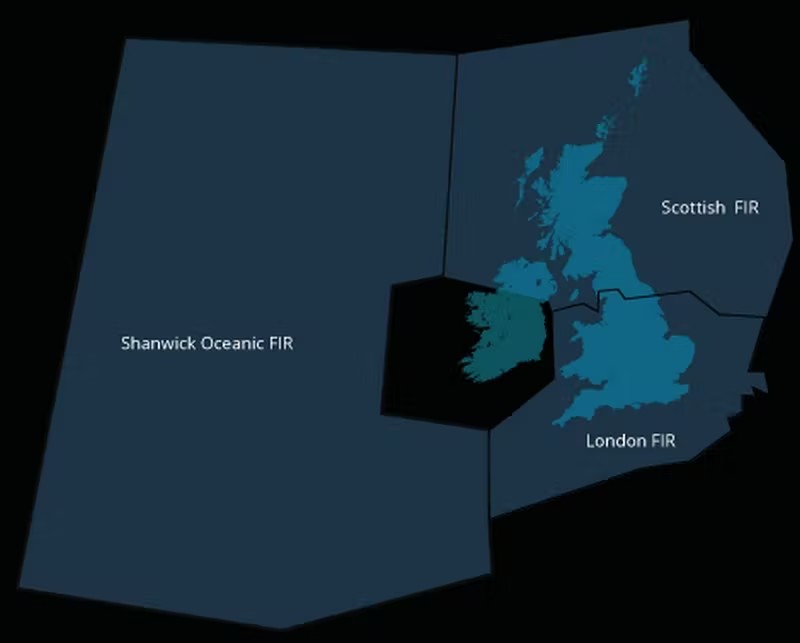
What’s the situation?
Basically, the Royal Air Force launches Typhoon fighter jets to intercept unidentified aircraft in the Irish ‘Flight Information Region’ for air policing duties because Ireland is incapable of doing so itself.
Make no mistake, the UK is not selflessly defending Irish airspace as this agreement is mutually beneficial to both states. Due to the speed of modern aircraft, the UK needs to be able to intercept aircraft even as far southwest as Ireland. Additionally, the controversial agreement also reportedly allows British aircraft to transit sovereign Irish airspace (different from the Flight Information Region mentioned above) should that be required.
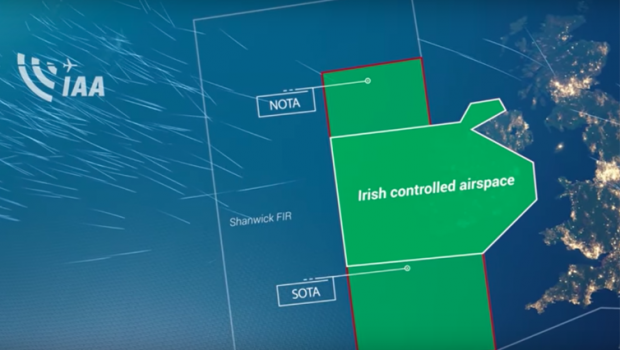
What’s the difference? Sovereign airspace (shown below) extends 12 miles from the coastline and is part of Irish territory however Flight Information Regions (shown above) are designed to ensure the safety of civil aviation and have provision for air traffic control services provided by a nation nearby.
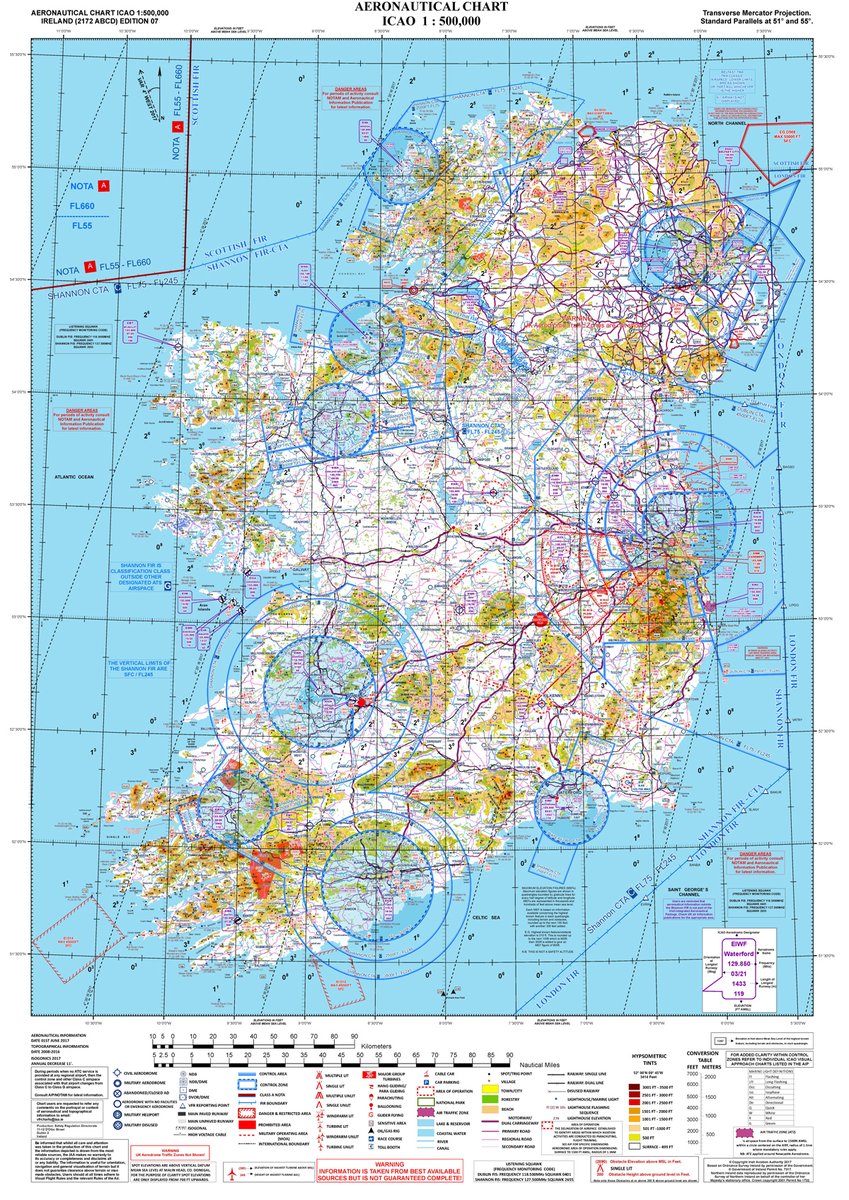
What’s the issue? Russia isn’t going to bomb Ireland, the issue is much simpler. Russian military aviation often flies through these Flight Information Regions without filing a flight plan or talking to air traffic control.
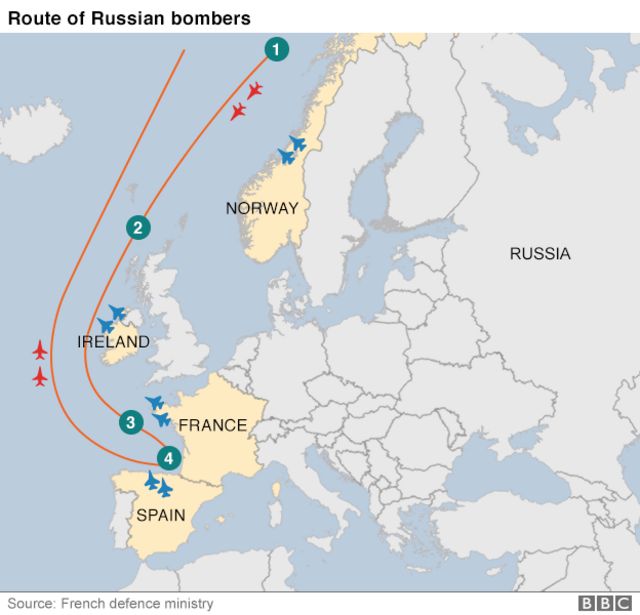
This turns them into stealth aircraft for a country with no ‘primary radar’ able to see them. This is dangerous due to the presence of airliners. When a fighter intercepts Russian aircraft it shows where the unresponsive aircraft is and allows for civilian traffic to be moved. The below image shows a normal day for air traffic in the region, it is incredibly busy.
Ireland operates ‘The Air Corps’, the service provides military support to the Irish Army and Naval Service but lacks any jet combat aircraft capable of intercepting Russian aircraft, as such British jets undertake the role.
This leads to the mistaken belief that Britain is responsible for Irish air defence, it is not. People on both sides of the Irish Sea however are aware that Ireland benefits significantly from this arrangement as it helps ensure the safety of Irish-controlled airspace.
There are discussions ongoing in Ireland to examine options to remedy this, including the purchase of fighter jets as my terrible mockup illustrates, but what will happen remains to be seen.
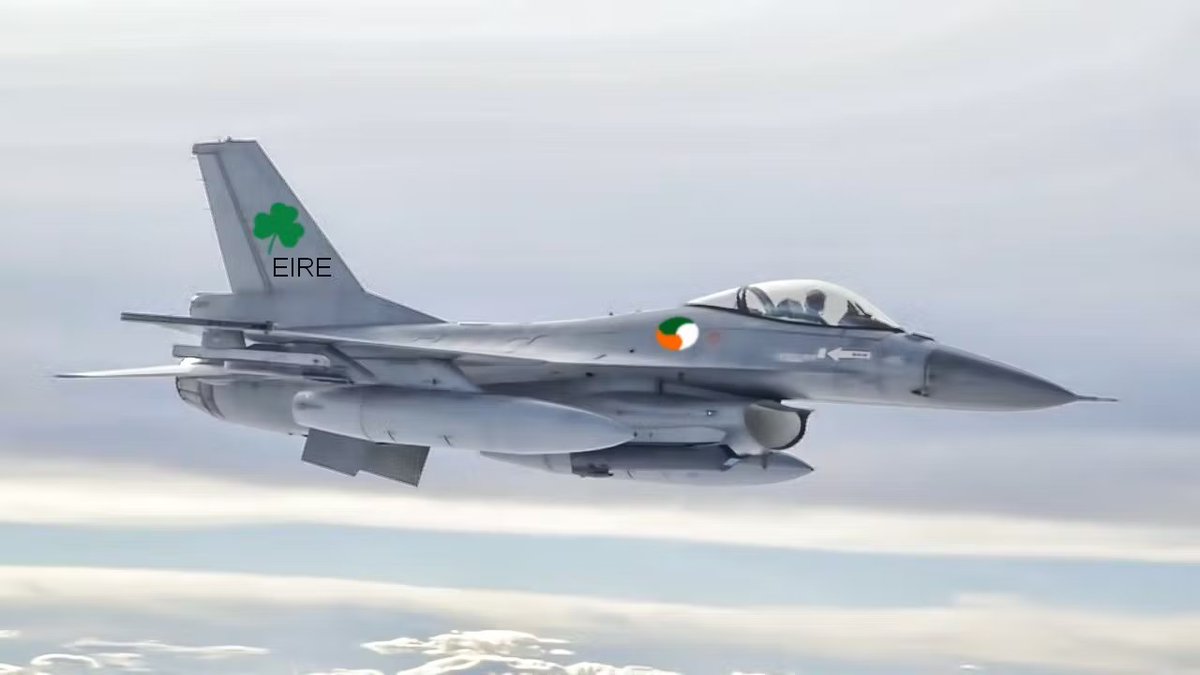
As I said above, the UK isn’t protecting Irish airspace, intercepting aircraft in the Flight Information Region as far away from the UK as possible benefits the UK but it’s not lost on people on both sides of the Irish Sea that Ireland benefits.
Many are likely to ask why Russia would aim to provoke Ireland? According to Dr Edward Burke, the director of the Centre for Conflict, Security and Terrorism at the University of Nottingham:
“The principal reason is that, from a Russian perspective, Ireland is a significant piece on the geopolitical chessboard. Situated between two of Russia’s principal adversaries, the United States and the UK, Ireland lacks the air defence capabilities to deter or defend against such provocative sorties into its airspace.
The Russian air force knows that it can approach or even enter Irish airspace with far less immediate and serious consequences than if it did the same to other north Atlantic countries such as Iceland where there is a Nato air policing mission – or Norway, which has a well-resourced air force capable of quickly intercepting suspected incursions.”
Why is this done?
All airspace around the world is divided into Flight Information Regions (FIRs). Each FIR is managed by a controlling authority (in this case the UK) that has responsibility for ensuring that air traffic services are provided to the aircraft flying within it.

Why? Andy Netherwood explains the reasons why here, but in summary:
“The first is flight safety. Whilst sovereign airspace only extends 12 miles from the coastline, countries are responsible for ensuring the safety of civil aviation, including the provision of ATC services, within areas known as Flight Information Regions or FIRs. These extend well beyond the 12-mile limit. Russian long range aviation often transits the London and Scottish FIRs without filing a flight plan, talking to ATC or ‘squawking’ (operating their transponders).Â
This makes them effectively invisible to civilian ATC and is very dangerous as airliners are also flying through this airspace. By shadowing Russian aircraft, the intercepting aircraft can show ATC where they are, allowing controllers to move airliners safely out of the way.
The second reason is because of the speed at which aircraft travel. An aircraft flying at 600 knots will travel 12 miles in little over a minute. Waiting until an unknown or hostile aircraft has entered sovereign airspace before intercepting is too late.
It leaves insufficient time to safely carry out the intercept, visually identify the aircraft, provide all the required information back to decision-makers, and carry out any necessary action. Russian aircraft will normally be intercepted by the Norwegian Air Force and then handed over to RAF aircraft ensuring they are continually shadowed.”
This isn’t as straightforward as it seems however, an often mentioned but secretive agreement also exists that allows UK combat aircraft to fly over the Republic of Ireland.
Senator Gerard Craughwell told the Seanad that allowing Royal Air Force fighter jets access to Irish airspace interferes with Ireland’s sovereignty.
Mr Craughwell was referencing a bilateral agreement between Ireland’s Department of Defence, Department of Foreign Affairs and the Irish Aviation Authority (IAA) with British counterparts: the RAF, the Civil Aviation Authority, the Ministry of Defence, and the Foreign and Commonwealth Office.
“The Constitution is the most sacred document in the country. It drives everything we do and should control everything that takes place in this House. I refer to Article 15.6 on the right to raise and maintain military forces, which right rests exclusively with the Oireachtas. Imagine my shock at the weekend when I discovered that an agreement had been signed between this country and the United Kingdom granting permission to the United Kingdom to scramble fighter jets in Irish airspace.
The agreement was signed by the Department of Defence, the Department of Foreign Affairs and Trade and the Irish Aviation Authority, which is not even a body responsible to the Oireachtas but a semi-State body. The agreement was signed before either this or the last Government came to power. I can find no evidence anywhere of Oireachtas oversight of the agreement or of a ministerial signature on it.
It creates a merger or a partnership in respect of our sovereignty. We talk about our sovereignty all the time, yet we are allowing jets of the Royal Air Force, RAF, to fly over the country. The director of Irish military aviation and the general officer commanding, GOC, of the Air Corps has no knowledge whatsoever of the agreement. It is my understanding that when he learned of it, he was taken into a room, shown the agreement and promptly sent home without a copy of it. The person with responsibility for military aviation in this country was not a party to the agreement.”
I spoke to @rtenews tonight about the agreement between the Republic of Ireland and the United Kingdom allowing British fighter jets to conduct air policing duties in airspace controlled by Ireland. pic.twitter.com/Yi3KTI89OH
— George Allison (@geoallison) June 9, 2022
In simple terms, what is this agreement for?
It is understood that the agreement allows British combat aircraft to transit sovereign Irish airspace for air counter-terrorism duties which includes responding to things like unresponsive airliners, hijackings etc.
I spoke to one Royal Air Force pilot that explained the diplomatic concerns behind any such agreement
“When the RAF launches against aircraft in the Irish Flight Information Region it’s doing so for NATO air policing/UK air counter-terrorism duties, although Ireland benefits as it makes their Flight Information Region safer. The key difference though is that if the RAF failed to intercept unknown traffic in UK airspace Chief of the Air Staff would have to explain why not. He is under no compulsion to launch against unknown aircraft in Irish airspace. Doing air policing for another nation is a minefield.
E.g. imagine the RAF intercepts a hijacked Aer Lingus airliner heading for Dublin. Who makes the decision to shoot it down? The UK PM? The Taoiseach? This can’t be done on the day, there needs to be rules of engagement agreed in advance, secure communications between the decision-maker and the operations centre at High Wycombe, and the decision-maker needs to be trained so they understand the constraints & impact of what they are being asked to decide.”
Is this agreement likely to change?
According to Dr Burke, Ireland (at least in the short term) will continue to rely upon the RAF to deter and monitor Russian or other aircraft that enter Irish airspace without permission.
“In the short term, Ireland will continue to rely upon the RAF to deter and monitor Russian or other aircraft that enter Irish airspace without permission”, he said.
“In the medium to long term it is difficult to countenance the State developing the expensive air defence and training systems to police Irish airspace alone. Ireland’s natural security partner in terms of geography is of course the UK. Is it possible that historical and political sensitivities might be overcome to bring about an RAF-Irish Air Corps all-island joint air policing mission in the future? For now, as the Russian Air Force could tell you, there is very little prospect of anything of the kind.”



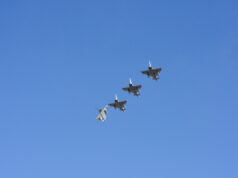
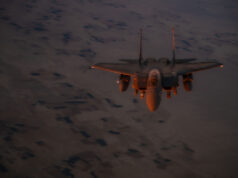
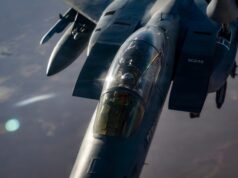

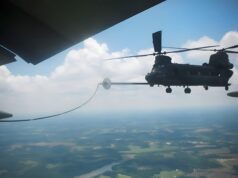
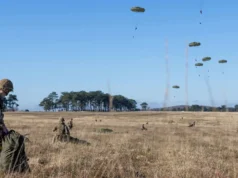
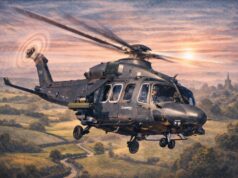


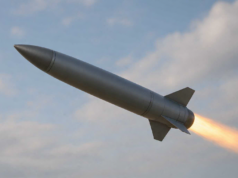

It is still wrong .
Not really, it is in our interests to be able to transit Irish airspace.
A well explained article, but as usual those who wish to further the politics and the squabbles concentrate on that.
Wrong to help Ireland with their defence capability? How? That is what allies and neighbours do, if asked.
No the Irish should have there own planes uk should keep out of Irish problems
The British haven’t kept out of Irish ” problems ” for hundreds of years Why stop now? Think Ukster.
“The UK, on occasion, scrambles jets to intercept unresponsive aircraft in Irish-controlled airspace but make no mistake, the UK is not protecting Irish airspace.”
I think we are trying to split hairs here to save the ROI blushes.
If it walks like a duck, and talks like a duck then it’s a duck.
The presence of RAF jets in Irish airspace means they ARE protecting it. If for whatever reason the planes were attacked they would respond in kind. Defending themselves and the associated airspace.
It is one of countless British spending on military activities that no one appreciates.
Some people agree that these activities of the British Army are overly distorted, but in reality, the contribution of these excessive activities to the interests of Britain is minimal.
Unless Ireland excessively forgets the ghost of Cromwell 300 years ago, the relationship between Ireland and Britain, where Britain loses unilaterally, must be fixed
The British “Army” ?
😅
No one appreciates? No one at all? Speak for yourself.
Why should the U.K. help Ireland they hate us, so if the Russians decides to move in U.K. should ignore it.
Well I get on all right with them ,It must be you.
The RAF fly the fighters!
Ireland is a new economically wealthy country with an economic growth rate several times that of Britain.
Ireland’s economy is strong enough to create a new RAF-sized air force.
This case, as always, is an incurable disease of some people who carelessly use the taxpayers’ money to do good for other countries and claim that it is Britain’s interest.
Irish gdp per capita is much higher than the UK’s, but taken as a whole the Irish economy is only about 1/6 the size of the UK economy. It would be very difficult, against the background of a broadly social-democratic country, to sustain an air force of the same size as the RAF off such an economic base. But the Irish economy is not much smaller than that of Norway, so should much more easily be able to sustain an air force of similar size to Norway’s, with capable modern jet fighters. That it does not is purely a matter of political choice.
Yes they do not need many high end planes – a single unt of 16 – 24 would do the trick, plus a decent radar. Perhaps we could sell them 5 crowsnest AEW sets.
They have nit built an airforce because they are content to save money buy letting the u.k. sub them out.
16 second hand F16C would do it at fairly cheap purchase cost. They could probably do a deal with the USA for training and support at a fairly low cost. Because of historic baggage, I can’t see them doing anything jointly with the UK…..
Biden thinks he is Irish so he will give them a special price….
Clinton from memory tried offering those F16s that were embargoed from Pakistan back in the 90s (the same ones that were offered to NZ) but nothing happened for pretty much the same reasons.
Even if they were given free the AC is in no shape to use them.
LM have already been over in the last month trying to sell everything from FA 50s, to second hand European F16s to new build F16s…
Its not happening anytime soon.
The irish do not have the money, if their econonmy was boom as they say, it would be easy to buy them but they do not have the money so they rely on the brits lol
Even a squadron of 12 would require ca. 1000 personnel, say 1/2 billion USD annually.
One of the former AC generals put it about a billion euros annually for 18 to provide for the tasking. Given the AC isn’t likely to get more than a couple of hundred extra in the establishment and that’s likely to go for other airframes it’s not happening anytime soon.
You are quite right why should they spend money when the UK does everything for them…..
Im pleased for Ireland to have a buoyant economy but not comparable with Norway which has a massive oil based sovereignty fund, they make surplus each year most likely.
The point is that the Irish economy is a bit smaller than Norway’s and a bit bigger than Denmark’s. Both those countries have modern fighters (24 F35 in the case of Norway, 33 F16 and 4 F35 in the case of Denmark. Ireland could afford similar.
The issue of course being both of those nations have been operating fighters all along. The AC is circa 1k people, to build out to operating fighters even if there was political will (and there isn’t) would take more than a decade, and there’s far more immediate areas to invest in.
Well yes, Ireland is a democracy and like it or not defence spending doesn’t win votes, and even beyond that the internal politics of the DF have their own issues as well. How the DF got to where it is has many different actors and forces, fixing the problems is far more than just buying some fighters.
Why is the UK making a losing “choice”?
In Ireland, fishermen deter Russian naval action. Does UK need a navy because its fishermen are not as brave as Ireland?
In Tom and Jerry, Jerry is said to be German and Tom is compared to UK.
In my opinion, it’s not a metaphor, it’s a fact.
UK behaves like Tom.
Ireland most certainly can sustain a larger air force. Ireland’s defence budget, at less than 0.3% of GDP, is the lowest in the EU
The GDP pers capita is a bit of myth, it dones by adding amazon etc a into the economy. When you lookat it closely it means nothing. Of Irish nationalst love it even it is wrong.
GDP per capita for the Republic ‘appears higher than UK for the simple reason they are a massive tax dodge both for the EU and for the rest of the world.
Google for instance just by ‘passing its money’ through its Irish entities – who have virtually no staff- they get a sweetheart tax deal of 2.2%, not the standard very low Irish corporate of 12.5%.
Theres many many others who work the same dodge , often with royalties or finance/lease back deals. Other EU tax havens work similar , Malta for example.
Airbus Industries corporate HQ is in Leiden in Netherlands , not that they have much more than accountants in the suburban office park building that is the HQ to take advanatge of the well known Dutch tax dodges. Of course Commercial Aviation is based in Toulouse and fast jets in Manching outside Munich and I think helicopters in Marseille area.
Luxembourg has a very high GDP per capita as the illusion of corporate money flows makes it so. It works for the tax lawyers and accountants based there , and those servicing them in return.
Give them whatever still exists of the Montrose their scrap merchants would be over the moon
Said it before and I’ll say it again, the fastest and most cost effective way for the Irish Air Corp to have gain a jet intercept capability is to request a joint squadron with either the RAF or USAF on UK soil using Typhoons or F15/16s respectively.
Obviously preferable for the UK would be with the RAF and in my opinion legitimises the current arrangement. It also gives an opportunity for both nations to improve relations and cooperation across the board.
For a host of reasons it’s not going to happen.
You say it every time Mark but at the end of the day, The AC must need to have the ability to intercept in Shannon FIR to maintain safe navigation for all other aircraft under international law (ICAO, Annex2,Attachment A&B) most nations who don’t/can’t join an alliance ie NATO.
If the RAF pulled out of the deal tomorrow how does the AC achieve this and I doubt “we don’t want too†will cut it to the UN/ICAO. It also means if ICAO used its powers to sanction, that no aircraft or pilot registered in Ireland would be able to fly outside Irish airspace.
Again the cheapest and simplest way to achieve that capability is to form Joint squadrons with other nations be it the RAF, USAF or any other NATO ally.
The AC has never had such capability and so far no such sanctions have happened, and there was no such agreement with the U.K. until post 9/11. How do other nations with no fighter jet capabilities or foreign air forces handle such matters? For example the Caribbean nations with their busy airspace?
Politics is politics whether we like it or not. There isn’t going to be “Joint squadrons†based in Ireland (for both domestic issues and foreign issues), nor at present is there political will for a fully Irish capability.
Like I said in the post to George while we are still in a holding pattern waiting on cabinet, the rumours of the broad scope of what’s likely is known. For the AC it’s Primary Radar (the major defence firms made unsolicited bids back in 2016, but so far only Leonardo has put anything forward this time), couple more 139s and a transport capability (from second hand 295s, to the wishlist of one of the RAF Hercules to the dark horse of the C390).
A question for you, New Zealand has no interception capability and hasn’t for what two decades? How have they not been sanctioned like you suggest?
There wasn’t a written agreement but it was still happening in the 90s just unofficially and case by case request.
They have an agreement with RAAF to intercept for them and I may be wrong now but they used to base a 4flight in NZ, they also have an incredibly active officer exchange with the RAAF, so they actually have a few fast jet qualified pilots which makes it considerably easier if they suddenly require the capability.
The Caribbean is mainly covered for intercept by the US Southern command 12airforce, Columbia’s and Brazilian Air Force and bolstered occasionally by Peruvian through many different accords, though there are individual states that can intercept they generally work together with 1 of the aforementioned air forces instead and the USAF is responsible for the oceanic area around the Caribbean.
ICAO have not sanctioned any country regarding lack of intercept of arrangements are in place, they have sanctioned individual pilots for unsafe interception of a civilian aircraft. If they have be identified.
They’re never going to sanction a military aircraft interception as they don’t cover that. But nations have been banned from attending ICAO meetings and major voting sessions for their behaviour towards civilian aircraft.
I would also argue that NZ’s operational environment is vastly different from Ireland’s. NZ is about 2,500 Km from its nearest neighbour. Australia who is NZ’s only ally, and the United States, are the only nations in that region of the pacific that maintain strike aircraft capable of reaching NZ. At the time of the scrapping of the Combat Air wing it really came down to do does NZ need to maintain a Combat Air wing that has not deployed since WWII, or a long range maritime Surveillance capability that deploys on task nearly every day.
I would love it if NZ was to reestablish a Combat air wing, but unless the situation changes it is pretty low down on the list of defence priorities that could and should be funded.
Ireland is in a VERY different operational environment.
I was under the impression that when NZ mothballed their intercept fighters, they entered into an agreement with Australia. There is also the fact that, as NZ is so far away from everything, the risk of incursion is deemed as minor.
Just think 12 Hawk’s will do the trick
Would have thought so? or would they need something a bit faster to
get out therequick? If its just for shadowing I suppose they will have a hand off, so know the bogey is coming. it beggars belief that they have no military grade radar to look at their own airspace.I believe there has been discussion in past over this very topic.
AA
Primary Radar has been on the wishlist for decades (along with plenty of other things) but has never got the backing for procurement, current noises suggest that at least will change over the next few years.
The general view is anything in the Hawk class doesn’t have the legs and speed to respond to any West Coast issues, though Leonardo floated their M346 alongside LMs suggestion.
Sell them the T-1 Typhoons?
And what, watch them rot in Baldonnel? The list of things that are needed before any fighters are bought is huge.
In a similar kind of way Cnanda benefits from it’s proximity to the USA in defence matters. Some theorize that this saves Canada billions in defence spending.
Andrew
While I agree, Canada doesn’t pull its weight to the extend it should, it does actually have a functional navy, air force & army. They do have fighters, frigates, submarines, tanks etc with replacement fighters & frigates somewhat on order. Their procurement system is a nightmare (only bettered by India). NZ does have a couple of operational frigates & with P8 MPA’s on order (replacing PC3 aircraft). Neither are where they should be. Ireland though, is not even in the picture.
Said it before and I’ll say it again, the fastest and most cost effective way for the Irish Air Corp to have gain a jet intercept capability is to request a joint squadron with either the RAF or USAF on UK soil using Typhoons or F15/16s respectively.
Obviously preferable for the UK would be with the RAF and in my opinion legitimises the current arrangement. It also gives an opportunity for both nations to improve relations and cooperation across the board.
The Irish have a lot of work to in terms of getting real. Despite being protected by NATO, they piously maintain their neutrality. Even if they bought themselves an air force, its effectiveness would be limited if it lay outside the NATO command structure. The first step for the Irish Republic would seem to be following the lead of Sweden and Finland and applying to join NATO. As it is, their claims to remaining neutral are start to look, shall we say, quaint.
Not happening.
If UK re-invaded, what would the EU actually do?
Likely argue for a couple of years. Then hold an inquiry. Then bluster for another couple of years. Then forget they ever existed. UK don’t want them. EU don’t want them. They are just stuck with them.
As we see with Russia, if a nuclear armed nation decides to invade a neighbour stopping them is tricky, not sure what the rest of your little rant.
It is about time Irish Republic got its own air force and did its own airspace security. I think we have some early Typhoons we are taking out of service can we sell 8 or so to them. They could pay us for maintenance services if they cannot do that.
They should also buy a radar capable of detecting hostile air threats.
It is about time they took their responsibilities seriously and spend some money. In effect the UK is subsidising the Irish for their security.
At the minimum an “air defence†radar of some sort is required.
What would happen if the uk did not intercept a transponderless Russian jet, and a civil aircraft hit it in Irish airspace…whose fault would that be?
AA
The Russian jet – it would not be conforming to ATC regulations and would have entered sovereign airspace without permission. I suspect the UK has permission from the Irish to do what we are doing but I doubt we are compelled to do so we would not be to blame.
If Austria that spends much more than Ireland have been considering selling their T1s what makes you think Ireland would want to go that route even if there was funding available? It’s interesting that so far it’s only been LM, Leonardo and Saab that have made any comments/outreach.
Primary Radar as I’ve said has been something on the Wishlist for years, and the most likely purchase, but it’s likely the transport capabilities of the AC will get attention in the next few years.
A Russian jet flies down to Spain , therefore Norway, UK , France and Spain share the shadowing responsibilities. It is quite a task.
Fast jets for Ireland has been discussed previously, it’s not cheap to maintain. Should Ireland not at least have a better radar picture?
Better radar has been on the wishlist for some time, and is one of the likely changes that will happen, fighters not so likely.
Lest commentators are mis-informed, it is not for the want of (Ireland’s)Defence Forces chiefs signalling the poor state of Irish defence capabilities. (.28% of GDP spent on defence, currently). Rather it is solely the unwillingness of our politicians to allocate the funds to finance an even barely adequate force, (I hesitate to use the the word ‘deterrence’, as this would be unsustainable.)
Those of us concerned, anxiously await the political decisions around the findings of the latest Commission into the Defence Forces.
It is also in no small part due to the unwillingness of the Irish public to support increased defence spending, just wait for the usual “but what about x issue†if the defence budget gets any significant increases.
New Zealand has a similar arrangement with Australia. The RNZAF also has no fast jets and in an emergency rely on the RAAF but of course the distances are far greater and the two countries have a very close relationship. I am surprised that the ROI has a much higher per capita GDP than the UK and wonder what factors are involved here? Could this be a function of their small population or on the other hand the UK’s burgeoning population? It might indicate that the UK has a larger number of unproductive or under-productive persons in the total? Remember tiny Nauru with their mountains of bird poo that once gave them the title of highest per Capita GDP in the world. Russia has a GDP smaller than the UK but more than twice the population.
It looks very good on paper due to all the foreign businesses based in Ireland, the issue being is they add to the economic output but don’t pay much in the way of taxes so it’s a bit misleading, so much so other metrics are usually used. None of that should detract from their ability to spend more on defence, they should easily be able to spend 4 times what they do at the moment.
There’s more than a few issues, as said Irish GDP figures are distorted by a number of factors, some a result of Irish policies, some more international procedures. That’s why the Irish central bank started using a different measure “modified GNI†from memory that strips out some of the GDP distortion. Again from memory strip out somewhere about 50billion off the GDP.
That said, yes the U.K. has had an issue with competitiveness and productivity in the labour market for decades when compared to other G7/G20 nations.
That photoshop of the F-16 is ridiculous. The Republic has not been called “Eire” since 1946.
Technically it’s never been called Eire as that’s the wrong Irish word, but more broadly the U.K. didn’t use Ireland or the Republic till the GFA in official correspondence as a policy.
There’s nothing really new since the last time George posted pretty much the same article 2 or 3 years ago so I’m not sure what the point is?
Apart from the entire article being updated and changed, you mean? Also, don’t take this the wrong way but it’s my website and I felt it appropriate to post this.
Forgive my imprecise post, yes of course you have updated the article, but the issue is effectively the same as before is it not? The capability gaps of the AC, the agreement with the U.K. and the nebulous nature of it is the same.
Until we see what the cabinet will sign off on (and between the Greens and the politics of the Cost of Living that’s an issue), nothing will really change even with the Commissions recommendations. Broadly speaking there’s a rough idea floating around of what might get approval, and fighters aren’t on that list but no idea of budget or timeframes.
If people over specify, it ( Irish Air Defences) will never happen. A decent radar plus half a dozen M346/FA-50 would be better than nothing & put the Russians on notice that they might be intercepted. Sure it would not stop squadrons of hostile jets, but most of the time, its just one or two stray aircraft to worry about.
The general view from the AC towards such a solution has generally been a lot of extra costs to a limited budget but without really being able to preform the mission of interception off the West Coast. Light fighters or armed trainers have been demoed before at Baldonnel with nothing happening. Primary Radar is most likely going to happen but fighters or armed trainers aren’t likely anything close to being on the list of capital acquisitions . In theory we should known a bit more by the end of the month, likely to slip if the Greens have their way.
The Irish need to get off zero. A small start, can be built upon later, if need be.
Like I said Primary Radar looks like it will get the nod, after that other priorities. For the AC some more helicopters and some degree of theatre transport capabilities to support international missions/evacuations. Fighters (light or otherwise) aren’t very likely to be on the list.
Primary radar is a must. Baby steps for the Irish Defence force though is the way to go. They need to sort out recruitment, pay and retention.
Heavy hardware , in all forms, comes next.
Yes.Yes.Yes’
A lot of simplict comments. With modern fighters you cannot just buy 16 jets and a radar problem solved. Look how the UK needed US help on the carriers after not having one for 10 years.Ireland would need the infrastructure, the training , the engineers etc etc. Secondhand and some newer ones need upto 50 hours maintenance to fly one hour. Building anything up from zero is very expensive. Yes it is in the UK’s interest, but no doubt the UK defends Ireland’s airspace tough if that offends Irish pride. I think there are some Irish who would prefer Russia to be bombing them! That’s the only way they will appreciate what the UK does for them, free of charge.
Ireland should police their own skies and seas. they have the means, all they need is a few squadrons of gripen and some t31s. would take a long time to build up, but it’s fiscally doable.
Some suggestion in the press that the primary radar system will have a capital budget of circa €200 million, no details on when any RFI might happen.
Easily solved if the ROI was in NATO, but they are not and have no intentions of spending 2%+ of their GDP on defence to be a member.
Says a lot about them really
Why would we want to join NATO, that wouldn’t our problems?
Russia is the only nation with the means to risk trying to take an airfield or port to strike at NATO forces if things kicked off. NATO isn’t stupid, they’d watch out for this too and stop it in it’s tracks long before it reached our shores. Not out of the goodness of their hearts, but because it simplifies their own mission.
And even if Russia does land troops? They can can, at best, put one or two infantry battalions ashore with limited logistical support. The Irish army can put a well-supported infantry brigade in the field with vastly superior logistics.
We don’t NEED to spend 2% on defense, even 1% would be enough and unlike NATO, we aren’t seen by some in a negative light. Our well-regarded standing on the international stage due to our Peacekeeping efforts does in deed, say plenty about us. Really.
Basically you are saying you want NATO to defend you but you don’t want to pay for it.
Not even close. NATO can’t afford Russian forces operating from our shores in the event of a wider conflict, it’d be a direct threat to NATO forces in the north Atlantic. But relying on their intervening as part of our defense policy would be the height of arrogance, not to mention foolishness on our part. Our goal should be deterrence, NOT matching fighting capabilities that are frankly, beyond our means.
Every nation has its right to set foreign policy, NATO for many reasons isn’t on the cards for Ireland, nor given how many members don’t hit the 2% mark wouldn’t be a solution either.
Considering that Ireland is meant to be one of the richest countries in Europe now (if you believe their ‘leprechaun economics’, that is) they should be capable of doing this themselves. Except even Leo Varadkar admitted recently that they have been relying on the UK for their own national defence. Their budget is after all less that 1 billion euro. Won’t be capable of much with that.
Not our “leprechaun economics†but how globally the figures are assessed, even with the modified GNI that can be used we are still more than capable of spending more on defence, however there is zero political gain from doing so.
You ‘might’ be capable but you’d still rather someone else pays for it. As I said your <1 billion euro budget isn’t going very far. (also, you expect us to believe your GDP magically jumped 25% in one year? People wonder why it’s been labelled ‘leprechaun economics’)
As for no political gain, what would you call the embarrassment of not being able to patrol your own borders properly? The Russians come knocking and the best you can muster is a ‘fleet’ (of soon to be disbanded) fishing vessels and angry exchanges in the Dáil.
You won’t be contributing much to the EU’s new armed forces unless you triple the defence budget. Even then you won’t be doing much.
In terms of that year for example it came about due to an external change in how leased aircraft were recorded as assets, moving from where they were leased to the country of their parent company, Ireland happens to have a large leasing sector which resulted in that jump, nothing to do with an internal action.
And no it’s not any political gain, the Irish voter cares about domestic issues far more than international affairs. As to the mythical EU army… yawn. There will never be a single integrated “EU Armyâ€, nor would it matter if if did as like Denmark (which they have since dropped) we have an opt out on defence matters anyway.
I don’t agree with the defence spending but I recognise reality that it’s not going to radically change, ironically enough though the U.K. through either hamfisted attempts to force changes in Irish FP by limiting defence procurement to Ireland (why they didn’t just drop the U.K. as a supplier and go with the US is beyond me), or through bits like this allowing Irish politicians to ignore the issue.
Nothing to do with Apple moving their IP to Ireland that year then for tax purposes. Which has little tax benefit but all the liabilities.
I never said there will be a single integrated EU army. But you should really look up what the Irish government have said they are willing to join. Doesn’t matter if an unelected political union has an armed forces. Right. OK.
Don’t look now but they already have one (Eurocorps) If you don’t believe they will expand why are they establishing a rapid reaction force with up to 5,000 of troops.
If you don’t believe me it is all freely available to those who can be bothered to look it up.
Irish Independent – 1 June 22
Leo Varadkar confident he could secure a Yes vote for Ireland to join EU army
Leo Varadkar has insisted it is “possible†to win a referendum in Ireland to join a European defence force but says there is no political support to join Nato.
The Tánaiste added that this European defence force should have “close links†to Nato, despite Ireland having “no plans†to join the military alliance.
“I do think it would be possible for us to win a referendum on joining a European defence (force) but I think that’s why it would be important for us to be a part of designing it alongside countries like Cyprus, Austria and Malta, who also don’t plan to join Nato,†he said.
No plans for an EU army you say… Ireland seem to be all for it.
We are defacto protecting Irish airspace. Some in the Republic might huff and puff that this is so but given they are so weak air defence wise they should consider themselves fortunate that we in the UK see an advantage in doing so. However I hope at the very least that the said ‘agreement’ we have with them includes a financial contribution to the same and they pull their fingers out and purchase a proper air defence radar system.
The overwhelming majority couldn’t give a feck about it one way or the other, though there’s no suggestion of any financial transfers of any sort. A Primary Radar system is meant to be moving forward on the shopping list, but that’s a wait and see.
The overwhelming majority couldn’t give a feck about it one way or the other… because they are kept like mushrooms and have no idea what is really going on.
There is any amount of information available for anyone who wants to learn about anything these days, if people don’t have even a basic level of understanding of sues it’s because they choose not to.
In the case of Irish public opinion on defence it’s because nobody outside the small defence group cares, that’s not going to change.
Yes, they don’t care because they rely on the UK and think it’s their own government doing it.
Nope, everyone is well aware of the limitations of the DF, it’s not a political/public concern.
So now they are suddenly limited in what they can do. Earlier you said they are more then capable.
I said we are more than capable of spending more to have more capabilities, at no time did I suggested that the DF had such capabilities.
“everyone is well aware of the limitations of the DF”
Make your mind up.
Even 3 billion (triple the budget) isn’t going to get much. Even then the UK would still be needed.
Ireland does not and cannot defend its own airspace. That leaves the UK.
Ireland is a wealthy country; ignore the nonsense around mainly American companies passing profits through Ireland which distorts the size of the economy. It does to some extent but not as much as people outside Ireland think.
The issue around defence spending is the same as in the UK and other democratic countries ; there’s no votes in it. Ireland spends less than 1% of GDP on defence.
This will increase to around 1.5% by the end of the decade (I think). A primary radar system is to be procured. There are huge staffing issues in the Air Corps and a lot of pilots head very quickly to civilian airlines once trained.
ideally 12 aircraft would be sufficient to do the role but the staff/pilots and support staff are the issue.
Technically no but in practice yes…
After all the political garbage, the article says that the UK will defend Irish airspace. After all, propeller driven a/c with only machine guns for armament will not do it.💋
‘We work very closely with the RAF’ – IAC pilots at an airshow some years ago.
We simply should not be entering Irish air space, The Irish dont contribute to our defence costs so should not benefit from it, and like it or not Anglophobia is still very strong in the republic. Surely in times of tension we could station RAF birds in Ulster. If they want to benefit from British / Nato air cover they should join NATO and pay up.
As long as present practice continues, Ireland has no reason to have an air force.
Six months ago??!!!